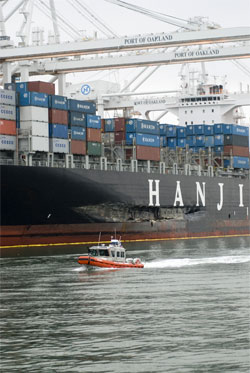A new California law mandates stricter safety regulations for pilots in San Francisco Bay, but the pilots say many of the changes were already in the works.
In September 2012, Gov. Jerry Brown signed into law the measure sponsored by the Pacific Merchant Shipping Association (PMSA). Among the provisions of the new law is a requirement that the California Board of Pilot Commissioners for the Bays of San Francisco, San Pablo, and Suisun (BOPC) establish enforceable rest periods and hours-of-service regulations for the bar pilots that guide vessels in the San Francisco Bay and River system and Monterey Bay.
However, the BOPC was already undertaking many of these improvements on its own in response to the National Transportation Safety Board’s (NTSB) investigation of the November 2007 Cosco Busan accident in San Francisco Bay. In this incident, the containership, operating in a dense fog under the guidance of a bar pilot, hit the San Francisco-Oakland Bay Bridge and leaked more than 50,000 gallons of bunker fuel into the bay.
“Some of this was really not necessary in my opinion. A lot of this could have and should have been handled at the commission” rather than being written in state law, said Capt. Peter McIsaac, president of the San Francisco Bar Pilots.
The law also makes explicit basic drug and alcohol prohibitions, and requires the BOPC to be notified of pilots convicted of driving under the influence.
The measures are in line with pilot safety regulations in other states, according to Paul G. Kirchner, executive director and general counsel for the American Pilots’ Association (APA).
“From a national perspective, there is nothing in the bill that represents a significant change or challenge to pilot operations or pilot regulatory systems,” Kirchner said. “Most states have some type of system for limiting the amount of work pilots do. San Francisco has had those for a number of years and they’re being tweaked.”
The PMSA sponsored the bill and a number of environmental groups supported the measure.
NTSB investigators of the Cosco Busan accident found that the pilot was impaired from his use of prescription medications and was unable to use the radar and electronic charts correctly. The pilot was fined and spent 10 months in prison.
The bill calls for the pilot commission to conduct a study of hours-of-service rules and rest periods to combat fatigue and establish a standard for maximum hours of service. McIsaac said the San Francisco Bar Pilots try to ensure that a pilot has a minimum 12-hour rest period between assignments.
Currently there are no regulatory standards for the maximum hours that a San Francisco bar pilot is allowed to be on duty. “If the voluntary guidelines were not followed, that could put people, vessels or the environment or all three at risk unnecessarily,” said Mike Jacob, vice president of the PMSA.
Pilot fatigue came under the spotlight as a result of the January 2010 accident involving the oil tanker Eagle Otome and two other vessels. Two pilots were guiding Eagle Otome through the Sabine-Neches Canal en route to Port Arthur, Texas, when the tanker collided with another cargo ship and a barge tow, spilling more than 462,000 gallons of oil into the water.
The NTSB found that contributing factors in the incident included pilot fatigue and bridge resource management. The NTSB found that the local pilots’ association did not consistently apply the piloting guidelines for rest and hours of service in their daily operations. (The pilots’ association and the APA both vigorously disputed the NTSB’s conclusion that fatigue was a factor in that collision.)
Pilot groups across the country are training pilots on fatigue and bridge resource management, Kirchner noted.
“Fatigue is perhaps the No. 1 issue right now in the operation of pilots and other mariners,” he said. “There’s a lot of training and awareness happening.”
Under the new California law, a San Francisco Bar Pilot will be required to refuse a pilotage assignment if the pilot is fatigued and believes the assignment cannot be carried out safely.
The new law also requires that the board request the driving records of applicants to the pilot training program and every applicant for a pilot license.
Under the new law the pilot commission will participate in the California Department of Motor Vehicles pull notice program for all pilot licensees and trainees. The pull notice program will notify the commission in the case of a pilot driving under the influence or driver license suspension or revocation.
Also, any person applying to be a pilot trainee, applying for a pilot license or renewing a license will have to disclose certain medical information, including prior substance abuse and any medical conditions characterized by a lapse of consciousness. The pilot commission is authorized to refuse training or licensing to an applicant who is determined to habitually use or abuse alcoholic beverages, narcotics or dangerous drugs.
Implementing the new regulations should not result in additional costs for vessel operators that pay fees for bar pilotage services, according to PMSA’s Jacob.

